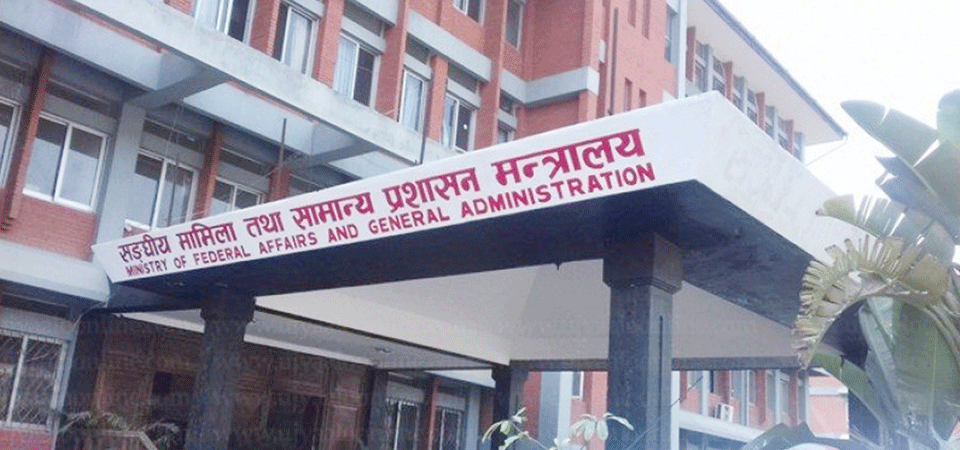Swift endorsement of Civil Service Bill emphasised

By Sampada A. Khatiwada
Kathmandu, Sept. 7:As soon as the provincial and local level elections were conducted in 2017, the government’s top priority lay in introducing a new Federal Civil Service Act in order to change the structure of the nation’s bureaucracy in line with federalism.
Four years after the promulgation of the Constitution, which ushered in the federal system of government, and two years after the elections took place, the Federal Civil Service Bill was registered in the Parliament Secretariat in February 2019. Although two years have elapsed since the bill was tabled, it has not been enacted yet.
The provincial and local level governments have been raising concerns over the delay in enforcement of the Federal Civil Service Act, which is an umbrella Act on the basis of which the province and local level governments frame their own civil service laws, as they have not been able to recruit new staffers or transfer and promote existing employees .
Former government administrators have also been stressing on prompt implementation of the Civil Service Act so that a competent, sound, accountable and responsive bureaucracy based on meritocracy can be built in all tiers of government.
Krishna Hari Baskota, former secretary at the Office of Prime Ministers and Council of Ministers, said, “It is unfortunate that the bill has not been passed yet. The Constitution has mentioned that all laws contradictory to federalism must be revised within three years.”
Stating that four years had already passed since the elections, Baskota said that the Act should have been implemented by now.
“Delay in passing the bill has acted as a bottleneck for all seven provinces and 753 local levels as they are unable to frame their own civil service laws until the bill is passed,” he said, adding that the Act providing guiding principles for the provinces and local levels to establish their own bureaucratic system must be enforced as soon as possible.
Baskota said, “Bureaucracy is considered to be the permanent government of the country. Thus, the nation cannot develop and prosper until the bureaucrats are made clear about the laws they are guided by.”
Similarly, former home secretary and former chairperson at Public Service Commission (PSC) Umesh Mainali said, “Due to the absence of Federal Civil Service Act, employment of civil servants in the province and local levels is uncertain.”
“The lawmakers might have their own or their parties’ reservations over the bill. Also, incumbent government administration could uphold their interests. Thus, the bill must be passed immediately by duly holding deliberations with former civil servants,” said Mainali.
Moreover, former chief secretary Leela Mani Paudyal said, “In order to abide by the principles of federalism, the Employees Adjustment Act, 2017, Federal Civil Service Act and Provincial Civil Service Act should have been implemented together.”
“It is our misfortune that the Act guiding recruitment, promotion, and retirement of civil servants has not been enforced yet. As promotion is the strongest instrument in encouraging government officials to work effectively, uncertainty over their promotion has demotivated them,” said Paudyal.
Stating that the Civil Service Act was the most important law that should have been implemented immediately after the nation adopted federalism, Paudyal stressed on immediate implementation of the Act.
Meanwhile, Prime Minister Sher Bahadur Deuba has said that the Federal Civil Service Act would be introduced soon in order to make the civil administration more systematic. Releasing a publication of Nepal Civil Servants’ Union on Saturday, PM Deuba said that the government was serious about the welfare and security of civil servants.
Recent News

Do not make expressions casting dout on election: EC
14 Apr, 2022
CM Bhatta says may New Year 2079 BS inspire positive thinking
14 Apr, 2022
Three new cases, 44 recoveries in 24 hours
14 Apr, 2022
689 climbers of 84 teams so far acquire permits for climbing various peaks this spring season
14 Apr, 2022
How the rising cost of living crisis is impacting Nepal
14 Apr, 2022
US military confirms an interstellar meteor collided with Earth
14 Apr, 2022
Valneva Covid vaccine approved for use in UK
14 Apr, 2022
Chair Prachanda highlights need of unity among Maoist, Communist forces
14 Apr, 2022
Ranbir Kapoor and Alia Bhatt: Bollywood toasts star couple on wedding
14 Apr, 2022
President Bhandari confers decorations (Photo Feature)
14 Apr, 2022











